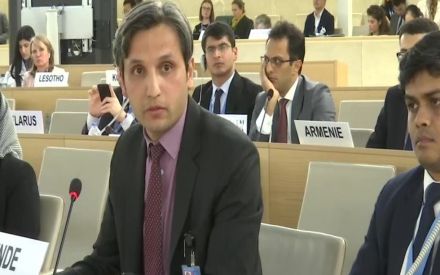Geneva: India Tuesday said the revocation of Jammu and Kashmir’s special status was within the country’s sovereign right and entirely an internal matter, rejecting Pakistan’s “hysterical statements” and its demand for an international probe by the UNHRC into the Kashmir issue.
Exercising its right to respond to Pakistan Foreign Minister Shah Mehmood Qureshi’s statements at the 42nd session of the United Nations Human Rights Council here, First Secretary in the Ministry of External Affairs Vimarsh Aryan said Article 370 was a temporary provision of the Indian Constitution.
The recent modification of Article 370 was “within our sovereign right and entirely an internal matter of India,” the diplomat said.
“We are not surprised at Pakistan’s hysterical statements with false narratives aimed to politicise and polarise this forum (UNHRC). Pakistan realises that our decision cuts away ground from under its feet by creating obstacles in its continuing sponsorship of cross-border terrorism,” he said.
Amidst Pakistan Prime Minister Imran Khan’s provocative anti-India statements, Aryan said, “Some Pakistani leaders have even gone as far as calling for jihad to encourage violence in Jammu and Kashmir and third countries to create a picture of genocide, which even they know is far from reality.”
The Indian diplomat from Jammu and Kashmir said Pakistan has the people of Kashmir are united to preserve the core values of democracy and Islamabad has “no locus standi to talk on Kashmir.”
He said at the UNHRC forum, Pakistan has pretended to speak as the voice of the global community on human rights. “But the world cannot be fooled. Pakistan’s gory record speaks for itself. This rhetoric will not distract international attention from Pakistan’s persecution and elimination of religious and ethnic minorities — be it the Christians, Sikhs, Shias, Ahmadiyas and Hindus,” Aryan said, adding that the persecution of minorities in Pakistan is well documented.
Earlier at the session, Pakistan Foreign Minister Qureshi demanded an international investigation by the UNHRC into the situation in Kashmir and urged the world rights body not to remain “indifferent” after India revoked Jammu and Kashmir’s special status.
He said the UNHRC must not remain indifferent to the situation in Kashmir after India revoked the special status of Jammu and Kashmir August 5.
“Today, I have knocked on the doors of the Human Rights Council, the repository of the world’s conscience on human rights, to seek justice and respect for the people of Kashmir,” he said.
Qureshi asked the Council to urge India to immediately stop the use of pellet guns, lift the curfew, reverse the clampdown and communications blackout, restore fundamental freedoms and liberties, release political prisoners and fulfil obligations under the UN Security Council Resolutions and various human rights instruments, as required by international law.
He asked the Council to constitute a commission of inquiry into the situation in Kashmir, as recommended by the Office of the UN High Commissioner for Human Rights. “We must not allow this august body to be embarrassed on the world stage. As a founding member of this Council, Pakistan feels morally and ethically bound to prevent this from occurring,” he said, adding that in order to do so the body should not remain indifferent to the situation that was unfolding.
“We must act decisively and with conviction,” Qureshi said.
